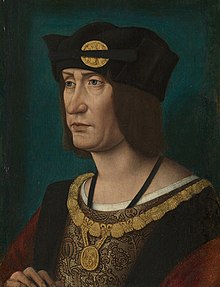
Back Loís XII de Francia AN لويس الثاني عشر Arabic لويس التناشر ARZ Louis XII (gazik ke Franca) AVK XII Lüdovik AZ اوْنایکینجی لوئی (فرانسه) AZB Людовік XII BE Людовік XII (кароль Францыі) BE-X-OLD Луи XII Bulgarian Loeiz XII (Bro-C'hall) BR
| Louis XII | |
|---|---|
 Louis XII in 1514 | |
| King of France | |
| Reign | 7 April 1498 – 1 January 1515 |
| Coronation | 27 May 1498 |
| Predecessor | Charles VIII |
| Successor | Francis I |
| Duke of Milan | |
| Reign | 6 September 1499 – 16 June 1512 |
| Predecessor | Ludovico Sforza |
| Successor | Massimiliano Sforza |
| King of Naples | |
| Reign | 2 August 1501 – 31 January 1504 |
| Predecessor | Frederick |
| Successor | Ferdinand III |
| Born | 27 June 1462 Château de Blois |
| Died | 1 January 1515 (aged 52) Hôtel des Tournelles |
| Burial | 4 January 1515 |
| Spouses | |
| Issue more... | |
| House | Valois-Orléans |
| Father | Charles, Duke of Orléans |
| Mother | Marie of Cleves |
| Signature |  |
Louis XII (27 June 1462 – 1 January 1515), also known as Louis of Orléans, was King of France from 1498 to 1515 and King of Naples from 1501 to 1504. The son of Charles, Duke of Orléans, and Marie of Cleves, he succeeded his second cousin once removed and brother-in-law, Charles VIII, who died childless in 1498.
Louis was the second cousin of King Louis XI, who compelled him to marry the latter's disabled and supposedly sterile daughter Joan. By doing so, Louis XI hoped to extinguish the Orléans cadet branch of the House of Valois.[1][2] When Louis XII became king in 1498, he had his marriage with Joan annulled by Pope Alexander VI and instead married Anne, Duchess of Brittany, the widow of Charles VIII. This marriage allowed Louis to reinforce the personal Union of Brittany and France.
Louis of Orléans was one of the great feudal lords who opposed the French monarchy in the conflict known as the Mad War. At the royal victory in the Battle of Saint-Aubin-du-Cormier in 1488, Louis was captured, but Charles VIII pardoned him and released him. He subsequently took part in the Italian Wars, initiating a second Italian campaign for the control of the Kingdom of Naples. Louis conquered the Duchy of Milan in 1500 and pushed forward to the Kingdom of Naples, which fell to him in 1501. Proclaimed King of Naples, Louis faced a new coalition gathered by Ferdinand II of Aragon and was forced to cede Naples to Spain in 1504. Louis, who remained Duke of Milan after the second Italian War, was interested in further expansion in the Italian Peninsula and launched a third Italian War (1508–1516), which was marked by the military prowess of the Chevalier de Bayard.
Louis XII did not encroach on the power of local governments or the privileges of the nobility, in opposition with the long tradition of the French kings to attempt to impose absolute monarchy in France. A popular king, Louis was proclaimed "Father of the People" (French: Le Père du Peuple) for his reduction of the tax known as taille, legal reforms, and civil peace within France. Louis XII died in 1515 without a male heir. He was succeeded by his cousin and son-in-law Francis I from the Angoulême cadet branch of the House of Valois.
- ^ André Vauchez, Michael Lapidge, "Encyclopedia of the Middle Ages: A-J", pp. 776, 2000: "Infirm from birth, she was obliged by her father, Louis XI, to marry her cousin, Louis of Orleans. The king wished, by a union considered sterile, to extinguish this rival collateral dynasty."
- ^ "The Eclectic Magazine of Foreign Literature, Science, and Art, Volume 33", pp. 42, 1854: "Louis XI compelled him to marry his deformed and sterile daughter Joan, threatening him with death by drowning, if he refused."